|
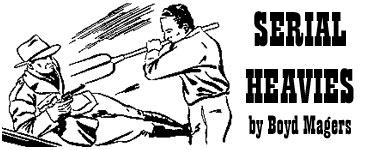
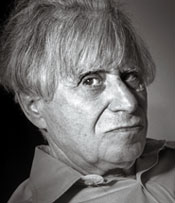 Theodore Gottlieb Theodore Gottlieb
To serial devotees Theodore Gottlieb is known as Hitomu,
a mysterious Asiatic who envisioned himself as emperor of the Earth in one of Republic’s last ‘classic’ serials, “The Black Widow” (‘47). Hitomu delegated the responsibility of securing atomic secrets and weaponry to his daughter Madame Sombra (Carol Forman) who operated under the guise of a fortune teller. When an unseen sonorous gong sounded, Sombra dismissed anyone present before she
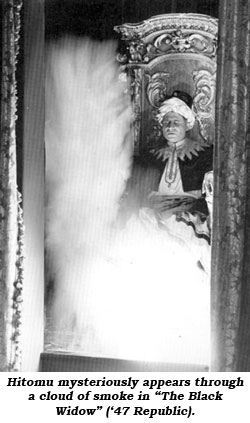 manipulated an array of controls which allowed a turban bedecked Hitomu to appear from a cloud of smoke, a seemingly instantaneous materialization from his native land to an ornate chair in his daughter’s lair. Hitomu magically appeared six times in the 13 chapter serial (Ch. 1, 2, 4, 6, 9, 13). In episode 13 mystery fiction author and criminologist Steven Colt (Bruce Edwards) shot through Hitomu’s smoky departure, plunging the Asiatic dictator to his death. manipulated an array of controls which allowed a turban bedecked Hitomu to appear from a cloud of smoke, a seemingly instantaneous materialization from his native land to an ornate chair in his daughter’s lair. Hitomu magically appeared six times in the 13 chapter serial (Ch. 1, 2, 4, 6, 9, 13). In episode 13 mystery fiction author and criminologist Steven Colt (Bruce Edwards) shot through Hitomu’s smoky departure, plunging the Asiatic dictator to his death.
As Brother Theodore, the diminutive Gottlieb’s real life career was as interesting—if not more so—than that of Hitomu. Born November 11, 1906, to great wealth in Dusseldorf, Germany (his father published 52 fashion magazines worth millions) Gottlieb attended the University of Cologne. When Hitler came to power, Gottlieb fled with his family to Vienna. He was taken to Dachau prison on his 32nd birthday only to be released when he signed over the family fortune. Eight members of his family died in the Holocaust including his parents and grandmother.
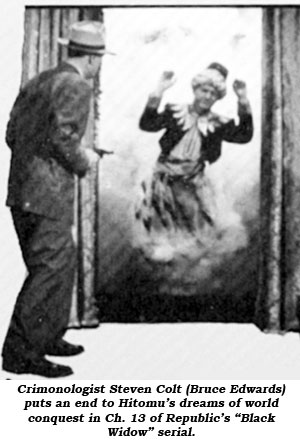 Theodore went from Dachau to Switzerland where he supported himself as a chess hustler. This violated Swiss law and he was deported to Austria. Professor Einstein, said by some to have been the lover of Gottlieb’s mother, helped Theodore get to the U.S. Theodore went from Dachau to Switzerland where he supported himself as a chess hustler. This violated Swiss law and he was deported to Austria. Professor Einstein, said by some to have been the lover of Gottlieb’s mother, helped Theodore get to the U.S.
Raised an aristocrat, Gottlieb suddenly found himself working as a janitor at Stanford University where he managed
to defeat 30 professors at chess—simultaneously.
Later, working as a dock worker in San Francisco, he put on his first one-man show by reading Edgar Allen Poe poems.
Next came a stint in Hollywood where he obtained a part in Orson Welles’ film “The Stranger” (‘46) and other small roles. His role as the nefarious Hitomu came in ‘47.
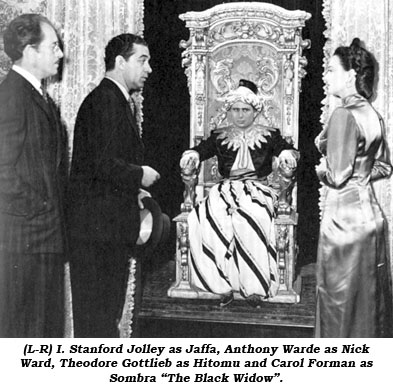 Gottlieb moved to New Year around 1948 after Welles showed a romantic interest in Theodore’s wife while making “The Third Man” in which Gottlieb had a bit part. He worked at Schroff’s restaurant while honing his monologue at small Bohemian clubs in Greenwich Village. As Brother Theodore he developed an apocalyptic one-man show about life, death and—broccoli—in Greenwich Village nightspots. His only prop was a table at which he would sit or stalk around flirting with the meaning of life in his sonorous German-accented voice. He called his act stand-up tragedy. “I’ve gazed into the abyss Gottlieb moved to New Year around 1948 after Welles showed a romantic interest in Theodore’s wife while making “The Third Man” in which Gottlieb had a bit part. He worked at Schroff’s restaurant while honing his monologue at small Bohemian clubs in Greenwich Village. As Brother Theodore he developed an apocalyptic one-man show about life, death and—broccoli—in Greenwich Village nightspots. His only prop was a table at which he would sit or stalk around flirting with the meaning of life in his sonorous German-accented voice. He called his act stand-up tragedy. “I’ve gazed into the abyss
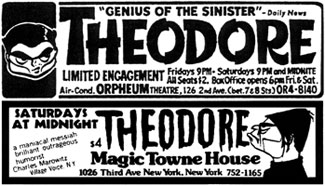 and the abyss gazed into me, and neither of us liked what we saw,” he told audiences, or “It’s my sincere wish that after my death, my head be severed and replaced with a bunch of broccoli. It’s the artist in me.” He wildly performed his act at the 13th Street Theatre for nearly two decades. He had six sellout per-formances at NY’s Towne Hall in the ‘50s. THE VILLAGE VOICE described him as “a maniacal messiah” and “a rabble rouser without a cause—unless his cause is to promote the power of negative thinking and the glorification of anguish and despair.” The NY DAILY NEWS termed him a “genius of the sinister.” and the abyss gazed into me, and neither of us liked what we saw,” he told audiences, or “It’s my sincere wish that after my death, my head be severed and replaced with a bunch of broccoli. It’s the artist in me.” He wildly performed his act at the 13th Street Theatre for nearly two decades. He had six sellout per-formances at NY’s Towne Hall in the ‘50s. THE VILLAGE VOICE described him as “a maniacal messiah” and “a rabble rouser without a cause—unless his cause is to promote the power of negative thinking and the glorification of anguish and despair.” The NY DAILY NEWS termed him a “genius of the sinister.”
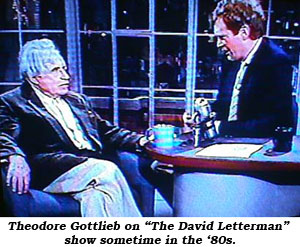 With the arrival of television he made regular appearances with Steve Allen and Jack Parr on the “Tonight Show” in the mid to late ‘50s and with Merv Griffin and Joey Bishop in the ‘60s and ‘70s. He later emerged as one of David Letterman’s regular guests in the ‘80s. He also was a comedy writer for Billy Crystal in the ‘80s. Gottlieb twice played Gollum…first in “The Hobbit” (‘77) and “Return of the King” (‘80). Several other film roles came his way in the ‘70s and ‘80s. With the arrival of television he made regular appearances with Steve Allen and Jack Parr on the “Tonight Show” in the mid to late ‘50s and with Merv Griffin and Joey Bishop in the ‘60s and ‘70s. He later emerged as one of David Letterman’s regular guests in the ‘80s. He also was a comedy writer for Billy Crystal in the ‘80s. Gottlieb twice played Gollum…first in “The Hobbit” (‘77) and “Return of the King” (‘80). Several other film roles came his way in the ‘70s and ‘80s.
In 1990 Gottlieb had an operation to correct breathing problems caused by having his nose broken in Dachau. “If I die,” he said, “best wishes for the rest of your life, if I don’t I’ll phone you.”
The smoke-filled netherworld abyss he so often referred to caught up with him at 94. Hitomu died at Mount Sinai Hospital in Manhattan on April 5, 2001.
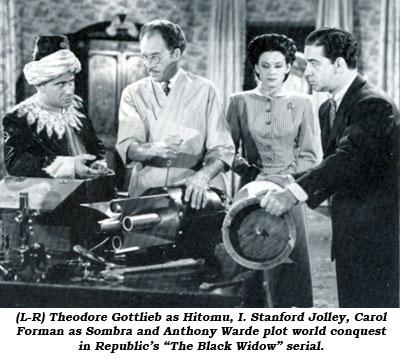

Virginia Lindley, co-star of Republic’s “Black Widow” (‘47), once studied for a career as a violin virtuoso. She gave her first concert at Redondo Beach, CA, in 1940. When the USO camp shows began with the outbreak of WWII, Virginia toured the Army camps giving concerts. Upon her return, she enrolled at Pasadena Playhouse and studied acting for two years. Modeling by day, she acted in the evening at the Bliss-Hayden Theatre, then made her screen debut in “Dragonwyck” (‘46) at Fox. Next came her role in “Black Widow”. At this point she changed her name to Virginia Lee and continued to work in films such as “Parole Inc.” (‘49), “The Robe” (‘53) and others. She also was billed as Virginia Ann Lee in “Annie Oakley: Annie and the Texas Sandman”, several “Death Valley Days”, “Get Smart”, “M*A*S*H*” and in films “Hawaiians” (‘70) and “Lost Horizon” (‘73). |
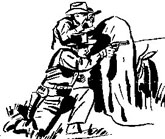 Western Serial Sidekicks Western Serial Sidekicks
Comic sidekicks were the norm in B-Westerns but for whatever reason Western serials generally eschewed popular B-Western sidekicks such as Smiley Burnette, Fuzzy St. John, Gabby Hayes, Max Terhune, Fuzzy Knight, Dub Taylor, etc. for lower echelon character players. Perhaps the top of the line sidekicks were too expensive or too busy. There were, of course, a few exceptions…Smiley Burnette worked with Gene Autry in “Phantom Empire”, Raymond Hatton was seen in “Rustlers of Red Dog”, “White Eagle” and “The Vigilantes Are Coming”; Leo Carrillo rode with Dick Foran and Buck Jones in “Riders of Death Valley” and Fuzzy Knight saddled up with Johnny Mack Brown for “The Oregon Trail”. But, here’s a look at 29 Western serials that employed second-tier sidekicks:
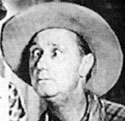 “Law of the Wild” (‘34 Mascot) Ben Turpin as Henry (right) “Law of the Wild” (‘34 Mascot) Ben Turpin as Henry (right)
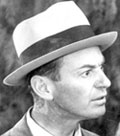 Mystery Mountain” (‘34 Mascot) Syd Saylor Mystery Mountain” (‘34 Mascot) Syd Saylor
as Breezy (left)
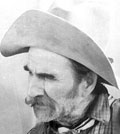 “Roaring West” (‘35 Universal) Frank McGlynn as Jinglebob Morgan (right) “Roaring West” (‘35 Universal) Frank McGlynn as Jinglebob Morgan (right)
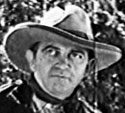 “Phantom Rider” (‘36 Universal) George Cooper as Spooky (left) “Phantom Rider” (‘36 Universal) George Cooper as Spooky (left)
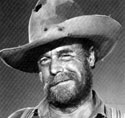 “Phantom Rider” (‘46 Republic) Hal Taliaferro as Nugget (right) “Phantom Rider” (‘46 Republic) Hal Taliaferro as Nugget (right)
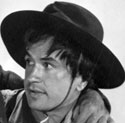 “Overland Mail” (‘42 Universal) Noah Beery Jr. as Sierra Pete (right) “Overland Mail” (‘42 Universal) Noah Beery Jr. as Sierra Pete (right)
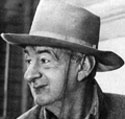 “Valley of Vanishing Men” (‘42 Columbia) Slim Summerville as Missouri Benson (right) “Valley of Vanishing Men” (‘42 Columbia) Slim Summerville as Missouri Benson (right)
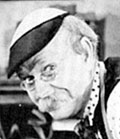 “Zorro’s Black Whip” (‘44 Republic) Lucien Littlefield as Tenpoint Jackson (right) “Zorro’s Black Whip” (‘44 Republic) Lucien Littlefield as Tenpoint Jackson (right)
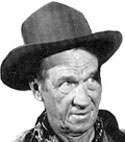 “Don Daredevil Rides Again” (‘51 Republic) Hank Patterson as Buck Bender (left) “Don Daredevil Rides Again” (‘51 Republic) Hank Patterson as Buck Bender (left)
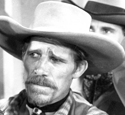 “Wild West Days” (‘37 Universal) Bob Kortman as Trigger Benton (right) “Wild West Days” (‘37 Universal) Bob Kortman as Trigger Benton (right)
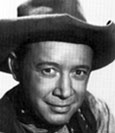 “Daredevils of the West” (‘43 Republic) Eddie Acuff as Red Kelly (left) “Daredevils of the West” (‘43 Republic) Eddie Acuff as Red Kelly (left)
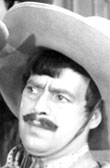 “Wild West Days” (‘37 Universal) Frank Yaconelli as Mike Morales (right) “Wild West Days” (‘37 Universal) Frank Yaconelli as Mike Morales (right)
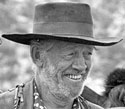 “Cody of the Pony Express” (‘50 Columbia) Tom London as Doc Laramie (left) “Cody of the Pony Express” (‘50 Columbia) Tom London as Doc Laramie (left)
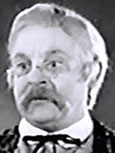 “Deadwood Dick” (‘40 Columbia) Harry Harvey as Dave (right) “Deadwood Dick” (‘40 Columbia) Harry Harvey as Dave (right)
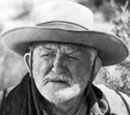 “Son of Geronimo” (‘52 Columbia) Budd Osborne as Tulsa (left) “Son of Geronimo” (‘52 Columbia) Budd Osborne as Tulsa (left)
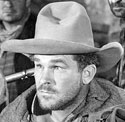 “Vigilantes are Coming” (‘36 Republic) Big Boy Williams as Salvation (right) “Vigilantes are Coming” (‘36 Republic) Big Boy Williams as Salvation (right)
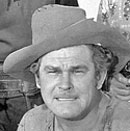 “Riders of Death Valley” (‘41 Universal) Big Boy Williams as Borax Bill (right) “Riders of Death Valley” (‘41 Universal) Big Boy Williams as Borax Bill (right)
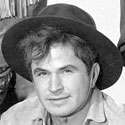
“Riders of Death Valley” (‘41 Universal) Noah Beery Jr. as Smokey (left)
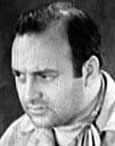 “Sign of the Wolf” (‘31 Metropolitan) Joe Bonomo as Bud (right) “Sign of the Wolf” (‘31 Metropolitan) Joe Bonomo as Bud (right)
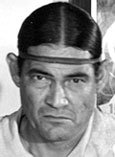
“Lone Ranger” (‘38 Republic) and “Lone Ranger Rides Again” (‘39 Republic) Chief Thunder Cloud as Tonto (left)
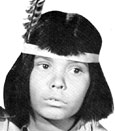 “Adventures of Red Ryder” (‘40 Republic) Tommy Cook as Little Beaver (right) “Adventures of Red Ryder” (‘40 Republic) Tommy Cook as Little Beaver (right)
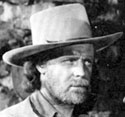
“Adventures of Red Ryder” (‘40 Republic) Hal Taliaferro as Cherokee (left)
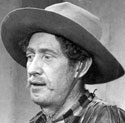 “Winners of the West” (‘40 Universal) Tom Fadden as Tex (right) “Winners of the West” (‘40 Universal) Tom Fadden as Tex (right)
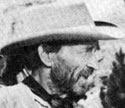
“Riding with Buffalo Bill” (‘54 Columbia) William Fawcett as Rocky Ford (left)
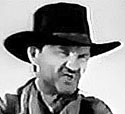
“Cody of the Pony Express” (‘50 Columbia) William
Fawcett as Ezra (left)
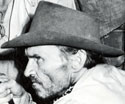 “Roar of the Iron Horse” (‘51 Columbia) William Fawcett as “Roar of the Iron Horse” (‘51 Columbia) William Fawcett as
Rocky (right)
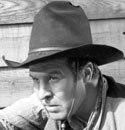
“Ghost of Zorro” (‘49 Republic) George J. Lewis as Moccasin (right)
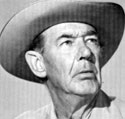 “Desperadoes of the West” (‘50 Republic) Lee Phelps as Rusty Steele (left) “Desperadoes of the West” (‘50 Republic) Lee Phelps as Rusty Steele (left)
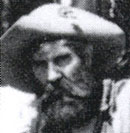 “The Last Frontier" (‘32 RKO) Slim Cole as Happy (right) “The Last Frontier" (‘32 RKO) Slim Cole as Happy (right)
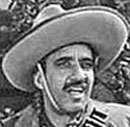 “Black Arrow” (‘44 Columbia) Martin Garralaga as Pancho (left) “Black Arrow” (‘44 Columbia) Martin Garralaga as Pancho (left)
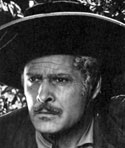 “Zorro Rides Again” (‘37 Republic) Duncan Renaldo as Renaldo (right) “Zorro Rides Again” (‘37 Republic) Duncan Renaldo as Renaldo (right)
Instead of a sidekick or comic relief, many other Western serials employed two heroes to share the action load, while others used the adult hero and a juvenile star…but those are both surveys for another time.
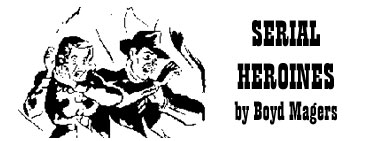
Ada Ince
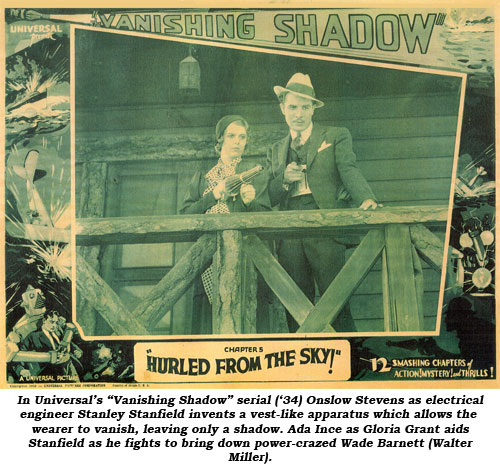
Ada Ince was born Ada Williams in Louisville, KY, in 1913. She won a Miss Florida beauty contest and became first runner up in a Miss United States contest. Her film career began in 1928. In ‘29, at the age of 18 she married William Thomas Ince, son of the noted film producer. She took the screen name Ada Ince and appeared as the leading lady to Onslow Stevens in Universal’s “Vanishing Shadow” serial (‘34) and “Frontier Days” with Cody. “Rainbow’s End” (‘35) w/Hoot Gibson ended her brief eight film career.
Divorced from William Ince in ‘34, the following year she married long-distance runner Ray Dodge who had competed in the ‘24 Summer Olympics. She died at 62 in Blowing Rock, NC, in 1975.

In Ch. 11 of “Son of Zorro” as George Turner walks into Tom London’s store, Tom says, “Hiya, Jeff” (Turner’s screen character) while Ed Cobb says, “Hello, George.” |
top of page
| 
